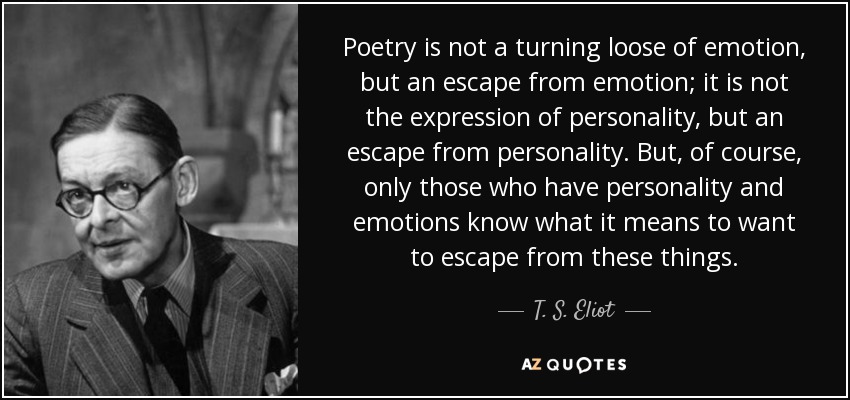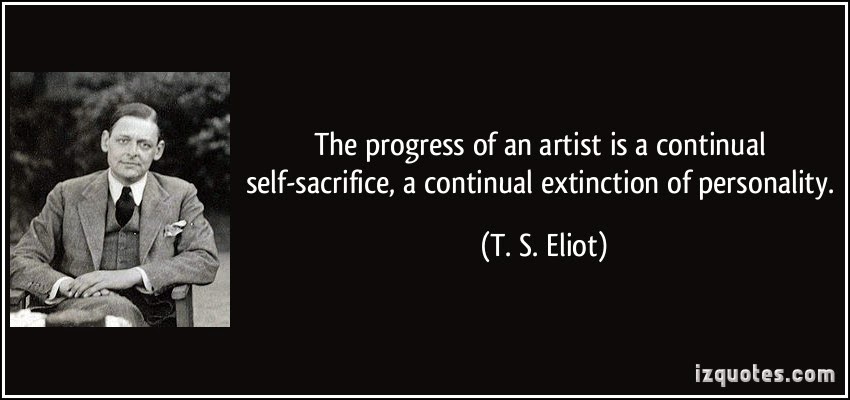"Poetry is not a turning loose of emotion, but an escape from emotion; it is not the expression of personality, but an escape from personality." – T.S Eliot
“Tradition and the Individual Talent" was published in The Egoist (1919), is a milestone in the field of literary criticism in the twentieth century. Some of his critical pronouncements contained in this essay have far-reaching consequences for the critics of the twentieth century particularly for the New Critics of USA in the 1940s. This essay has many dimensions. First of all, it attacks the Romantic Criticism of the nineteenth century (particularly Wordsworth's theory of poetry), secondly, it underlines the importance of tradition and examines the correlation between 'tradition' and 'the Individual Talent' and finally, it anticipates the death of the author and announces the focus shift from the author to the text.
In the first part of the essay Eliot defines tradition and examines the
relationship of any poem by any poet to other poems by other poets which form
the poetic tradition. Because no poem or no poet is an island. Tradition
largely influences every budding poet.
The essay "Tradition and the Individual Talent" can be considered as
the forerunner of New Criticism. Eliot's concept of tradition' is central to
all his critical writings. By tradition, he does not mean, the mere adherence
to the past, it does not stand for the continuance of old beliefs and dogmas.
Eliot alerts the readers against taking tradition as a mere imitation and adaptation
of the ways of our immediate predecessors. It should be discouraged. Tradition
must be acquired by those poets who wish to continue as poets after the first
effervescence of adolescence and youth is over. Here, tradition cannot be
inherited, it has to be obtained with great labour. Eliot outlines his concept
of 'tradition' in the following words:
"It involves in the first place, the historical sense [...] and the historical sense involves a perception, not only of the pastness of the past, but of its presence; the historical sense compels a man to write not merely with his own generation in his bones, but with a feeling that the whole of the literature of Europe from Homer and within it the whole of the literature of his own country has a simultaneous existence and composes a simultaneous order. This historical sense, which is a sense of the timeless as well as of the temporal (universal) , is what makes a writer traditional".
This historical sense,' is the awareness of the best fruits of the past and the
consciousness of a common unity and continuity of culture, will only help in
the growth of a literary tradition.
Like destiny in classical tragedy, Eliot's tradition determines the course of
the individual talent. Tradition is not only much more valuable but also much
more powerful and pervasive than the individual talent. The individuality of
the poet is derived from tradition and after he has completed his task he gets
absorbed into it. literary tradition depersonalizes an individual poet.
The historic sense enables us to see a poem not as an isolated and
self-contained instance of poetry, but as a link with similar poems by old
poets and as such the culmination of poetic idea or feeling which has persisted
through a poetic tradition.
In fact Eliot's concept of tradition functions like a system in
structuralism. The system exists independently of the individual author. But no
author, no text will convey its full meaning in isolation from tradition. No
poet, no artist has his complete meaning alone. His significance, his
appreciation is the appreciation of the relation to the dead poets and artists.
The poet has his roots in the literary tradition, just as every text carries
with it its underlying system. When Eliot writes that "the poet has not a
personality to express, but a particular medium which is only a medium and not
a personality, in which impression and experiences combine in peculiar and
unexpected ways," the medium is the mind of the individual poet which is
replica of the literary tradition, "the mind of Europe." so the
literary tradition finds in the individual mind a medium for its expression.
Thus, it is tradition which write poetry, not the poet and therefore a writer
has only a medium to express not a personality.
The relation between tradition and the individual talent is bilateral
relationship. If tradition influences the individual poet, the individual poet
too influences the tradition and the past acquires an ever new meaning because
of the contribution made to it by the new poets. As Eliot rightly says that the
past influences the present, as much as the present also influences the past.
The second section of the essay begins with an important statement,
"Honest criticism and sensitive appreciation are directed not upon the
poet but upon the poetry." This marks a clear departure from biographical
criticism, and the beginning of 'textual or practical criticism. The
emphasis has shifted from the author to the text. After making this significant
statement (as quoted above) Eliot goes on to explain his impersonality theory
of poetry and examine the relationship between the poem and the poet.
Eliot maintains that a poem or a work of art, is an autonomous entity. He seeks
to distance the poet from the poem by saying that to create a good poem, one
should surrender the self. This self sacrifice of personality gives birth to a
good poem. One should negate his mind. In doing so one loses his individuality
and his personality. All the personal emotions, feelings and experiences should
be sacrificed. There should not reflect the personal image of poet in his
poetry. Poetry should be completely impersonal. But it does not mean that the poet
should not write his personal feelings, but there personal feelings should be
converted in to art’s feelings. Therefore, we as a critic should not look for
personality of poet in his poem because the text is objective. The theory that
the poet should surrender his personality is depersonalization. The poet’s
personal feelings and emotions should be depersonalized. The act of composing poetry must be impersonal and objective like a scientist.
The progress of the artist is a continual self-sacrifice a continual extinction of personality is the individual talent.
To make the concept of depersonalization clear, Eliot brings analogy of creating sulphuroic acid.
Sulpher dioxide (Feeling) + oxygen (Emotion) + platinum (Mind of Poet) = Sulphurous Acid (Poem) (No trace of Poet’s Personality)
As the platinum itself remains unaffected, the mind of the poet remains unaffected also. Poet's personality is just an agent or medium to active the relation between emotion and feelings. So, the poet is never a creator, but like catalyst (Poetry is organization rather than inspiration).
Towards the end of Section II of the essay, Eliot attacks Wordsworth's
theory of poetry by saying that "emotion recollected in tranquillity is an
inexact formula." Instead he suggests that, "Poetry is not a turning
loose of emotion, but an escape from emotion; it is not the expression of
personality, but an escape from personality."
In the concluding section (i.e., Section III) of the essay Eliot says that the
poet must escape from his personal emotion and take that emotion 'which has its
life in the poem' only then, he can achieve impersonality in his art, As far as
he is concerned the emotion of art is
impersonal.
The most significant utterance in this section is as follows: “To divert
interest from the poet to the poetry is a laudable aim”. This lays the
foundation of New Criticism and makes Eliot the forerunner of the New Critics
of USA in the 1940s.


Sir,
ReplyDeleteGreat effort. Very useful and helpful. All the best. Expects more such videos.
Brilliant
ReplyDeleteThanks a lot Sir.
I was searching for this kind of notes for a long
Just wow- Nisha
ReplyDeleteGo ahead sir
You are really an inspiration 💖💕